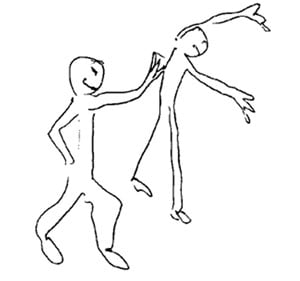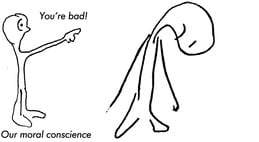UNDERSTANDING THE TEENAGE MIND
“Resignation is the most important psychological event to occur in human life and yet it is very rarely acknowledged and almost never discussed and analysed.” Jeremy Griffith

Jeremy Griffith’s explanation of the human condition finally makes it possible to understand our species’ psychologically upset angry, egocentric and alienated state. In doing so, he also makes it possible to appreciate the psychological process of ‘Resignation’ that teenagers go through as they attempt to understand the human condition both within themselves and the world at large—an invaluable insight for those working on the frontline of adolescent mental health:
“Understanding Resignation has been incredibly beneficial for my own understanding of the anxiety and depression these boys are experiencing, and why adults struggle to deal with those painful emotions even though they probably went through a similar experience in one way or another. Jeremy’s explanation of what happens after Resignation makes the connection between my long held confusion of how adults seem to have amnesia about their behaviour as a youth.” Doug Gibbs, teen counsellor & WTM Whangarei Centre founder
The following is an excerpt from Freedom Essay 30: Resignation
‘Resignation’, the unacknowledged yet most important psychological event in human life
Written by Jeremy Griffith, 2017
As humans grew up in a human-condition-stricken world that wasn’t able to be truthfully analysed and explained, we each became increasingly troubled by the glaringly obvious issue of the extreme ‘imperfections of human life’ (as Plato referred to ‘our human condition’). This progression went through precise stages. As consciousness emerged in humans we progressed from being able to sufficiently understand the relationship between cause and effect to become self-conscious, aware of our own existence, during our infancy, to proactively carrying out experiments in self-management during our childhood, at which point all the manifestations of the human condition of anger, egocentricity and alienation began to reveal themselves. It follows that it was during our childhood that we each became increasingly aware of not only the imperfection of the human-condition-stricken world around us, but of the imperfection of our own behaviour — that we too suffered from anger, selfishness, meanness and indifference to others. Basically, all of human life, including our own behaviour, became increasingly bewildering and distressing, to such a degree that by the time children reached late childhood they generally entered what is recognised as the ‘naughty nines’, where their confusion and frustration was such that they even angrily began taunting and bullying those around them.

The frustrated, naughty, bullying final stage of childhood
By the end of childhood, however, children realised that lashing out in exasperation at the imperfections, wrongness and injustice of the world didn’t change anything and that the only possible way to end their frustration was to understand why the world, and their own behaviour, was not ideal. It was at this point, which occurred around 12 years of age, that children underwent a dramatic change from being frustrated, protesting, demonstrative, loud extroverts into sobered, quiet introverts, consumed with anxiety, and deeply thoughtful, about the imperfections of life under the duress of the human condition. Indeed, it is in recognition of this very significant psychological transition from a relatively human-condition-free state to a very human-condition-aware state that we separate these stages into ‘Childhood’ and ‘Adolescence’, a shift even our schooling system marks by having children graduate from what is generally called primary school into secondary school. What then happened during adolescence was that, at about 14 or 15 years of age and after struggling for a few years to make sense of existence, the search for understanding became so confronting of those extreme internal imperfections that adolescents had no choice but to give up the struggle and ‘resign’ to living in denial of the whole unbearably depressing and seemingly unsolvable issue of the human condition—after which they became superficial and artificial escapists, not wanting to look at any issue too deeply, and, before long, combative and competitive power-fame-fortune-and-glory, relief-from-the-agony-and-guilt-of-the-human-condition-seeking members of the resigned adult world.

Approaching Resignation

The moment of Resignation
(You can read a much more complete description of all the stages of human life as it existed under the duress of the human condition in chapter 8 of FREEDOM.)
Delving deeper into how the journey toward ‘Resignation’ unfolds will make it clear why resigned humans became so superficial and artificial—so alienated/soul-dead/Plato’s-cave-dwelling—in their behaviour and thinking.
So what happened at around 14 or 15 years of age for virtually all humans growing up under the duress of our species’ massively corrupted or fallen human condition was that to avoid the suicidal depression that accompanied any thinking about the issue of our species’, and our own, seemingly extremely imperfect, soul-corrupted condition, there was simply no choice but to stop grappling with the answerless question. And so despite the human condition being the all-important issue of the meaningfulness or otherwise of our existence, there came a time when adolescents reached the age of about 14 or 15 that they were forced to put the whole depressing subject aside once and for all and just hope that one day in the future the explanation and defence for our species’, and thus our own, apparently horrifically flawed, seemingly utterly disappointing, sad, soul-devastated state would be found, because then, and only then, would it be psychologically safe to even broach the subject.
Read the complete Freedom Essay 30: Resignation—the unacknowledged yet most important psychological event in human life
Having the explanation and defence for our species’ human condition transforms the lives of all humans from a state of insecure adolescence to a state of unimaginable happiness and excitement—enabling future generations of adolescents to never again have to resign to a life of soul-deadening, dishonest, alienated block-out and escapism. The human race comes back to life now. We are ‘Free at last! Thank God Almighty, we are free at last!’ as Martin Luther King Jr dreamed we would one day be.
You can read more about the all-exciting Transformation of the human race that the redeeming explanation of the human condition now makes possible in Freedom Essay 15.
